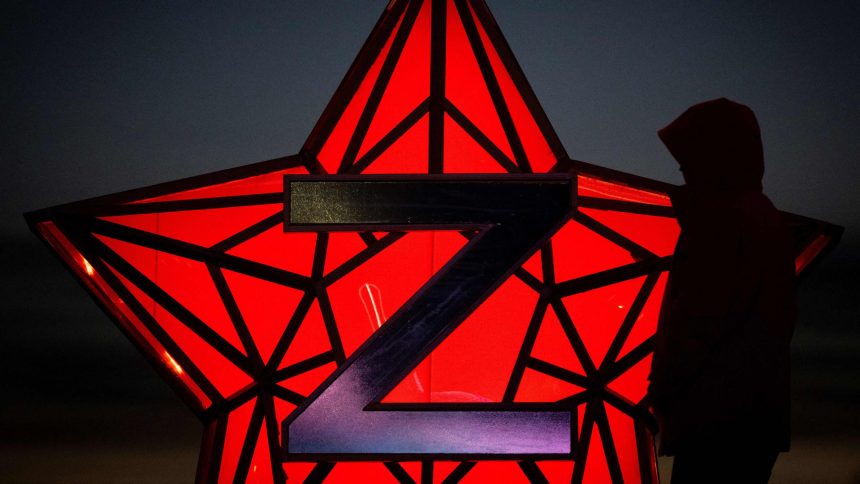EU chief ‘very confident’ of continued U.S. support for Ukraine
European Commission President Ursula von der Leyen said Thursday that Europe’s support for Ukraine was at the core of talks in Spain, saying there was a “strong message to Putin from Dublin to Chisinau that we do not tolerate aggression against a sovereign state.”
Asked about concerns over the long-term support to Ukraine from the U.S., the EU’s von der Leyen said, “It was very important that President Biden informed us at the beginning of this week what the support for Ukraine is concerned from the side of the United States.”
“Here, in the European Union, we are working on a package of 50 billion euros [$52 billion] for Ukraine for the years 2024 to 2027. This is very important because Ukraine needs predictability and reliability in the direct budget support,” she told reporters in Granada for a summit of the European Political Community.
“As far as I oversee the situation in the United States, I am very confident of support for Ukraine from the United States. What the United States is working on is the timing.”
— Sam Meredith
EU’s top diplomat says Europe can do more but it cannot replace U.S. support for Ukraine
The European Union’s foreign policy chief said Europe would not be able to replace U.S. support for Ukraine amid Russia’s full-scale invasion.
“Well, I was in Kyiv some days ago just at the moment when we knew that the U.S. Congress had not included support to Ukraine on the big deal about the budget in order to avoid the shutdown,” Josep Borrell told reporters Thursday in Granada, Spain, for a summit of the European Political Community.
“That was certainly not expected, and it is certainly not good news, but I hope it is not going to be a definite position of the U.S.” he continued. “Ukraine needs the support of the European Union, which is sure, they will have it and we will increase it. But also, the support of the U.S.”
Asked whether Europe can fill the gap left by the U.S. amid concerns about Washington’s long-term support for Kyiv’s war effort, Borrell replied “Certainly Europe cannot replace the U.S.”
— Sam Meredith
Zelenskyy asks allies for more help in emotional speech
An emotional President Volodymyr Zelenskyy asked European leaders for more help to defeat Russia as he attended an informal gathering of regional leaders in Spain Thursday.
In an emotional speech, Zelenskyy said the war had disturbed every aspect of Ukrainian life and society and he called upon Kyiv’s partners to help provide it with more air defenses.
“Until there is a fully effective air defense system, children cannot attend school,” he told the European Political Community summit hosted in Granada, in comments reported by Reuters.
“Let only Putin’s ambitions be a ruin, not our countries, not our cities. Children of every country deserve to be safe. Everywhere in the country, not just in the subway, not just in underground shelters, but everywhere. We must make it possible. We must ensure that Ukraine wins.”
Referencing recent concerns over the level of continued funding for Ukraine, particularly after the U.S. paused new funding for Kyiv for 45 days as part of a bill passed by the U.S. Congress to avert a government shutdown, Zelenskyy said he remained confident in U.S. support despite the “political storm.”
“I am confident in America. They are strong people with strong institutions, and a strong democracy,” he said.
— Holly Ellyatt
EU’s Borrell hopes U.S. will change stance to keep supporting Ukraine
Infighting in Washington that has cast doubt on continuing support for Ukraine is “bad news”, European Union’s top diplomat Josep Borrell said on Thursday, expressing hope that it was not yet the final position.
He spoke at the start of a meeting of the European Political Community Summit, a forum to foster cooperation among more than 40 countries established after Russia’s invasion.
European leaders gathering in Granada are expected to assure Zelenskyy of long-term support after U.S. President Joe Biden voiced fears that Republican infighting in Congress could hurt American policy on continuing aid to Kyiv.
— Reuters
Russia trying ‘unsuccessfully’ to capture towns, while Ukraine slowly advances
Russian armed forces are continuing to try to capture Marinka and encircle Avdiivka in the Donetsk region of eastern Ukraine, a Ukrainian official said Thursday, noting that those attempts had been unsuccessful so far.
Both the towns have been largely destroyed. Earlier this year, one regional official described Avdiivka looking like “a place from post-apocalyptic movies.”
“The occupants want to take Marinka with all their might to show some kind of success and are trying to surround Avdiivka as usual,” Oleksandr Shtupun, the spokesman of the Defense Forces of the Tavria region, said Thursday.
“They are not succeeding, but they will try to gain some operational space,” Stupun said in comments reported by news agency Ukrinform.
“They think it will be some kind of improvement for them. At the moment they are suffering losses, our soldiers are standing firm and defending Avdiivka and the neighboring settlements,” the spokesman said.
“We are ready for any enemy action, all our troops are on standby, and we are not just mindlessly going on the offensive, we are gradually advancing, gaining ground and continuing our activities.” CNBC was unable to immediately verify the information.
— Holly Ellyatt
The Kremlin tells CNBC what Putin values most in his inner circle
Russian President Vladimir Putin is known to keep a tight-knit group of officials and aides close to him, with the majority of his inner circle having served him for many years.
Putin’s press secretary told CNBC that loyalty is one of three qualities the president values most but that “loyalty alone is not enough.”
For more insight on Putin’s inner circle and what makes the president tick — from those that work with him now and have done in the past — read more here:
‘Loyalty alone is not enough’: What Putin demands from his inner circle
— Holly Ellyatt
Kremlin: Questions about Russian navy operations are for defense ministry
The Kremlin on Thursday said questions about Russian naval operations should be directed to the defense ministry after the Wall Street Journal reported that Russia had withdrawn the bulk of its Black Sea Fleet from its main base in annexed Crimea.
The WSJ said the move had been a response to Ukrainian attacks. Russia seized and unilaterally annexed Crimea from Ukraine in 2014. Kyiv has vowed to restore its control over the peninsula and the other territories that Russia has captured.
Kremlin spokesman Dmitry Peskov declined to comment on the story, or on reports that Russia had signed a deal for a permanent naval base on the Black Sea coast of the breakaway Georgian region of Abkhazia.
— Reuters
Ukraine’s President Zelenskyy in Spain for summit
Ukrainian President Volodymyr Zelenskyy is in Spain on Thursday to take part in an informal gathering of EU heads of state and government in the city of Grenada.
“We are working together with partners on enhancing the European security architecture, particularly regional security,” the president said on X, formerly known as Twitter.
“We will pay special attention to the Black Sea region as well as our joint efforts to strengthen global food security and freedom of navigation,” he said, noting that Ukraine’s key priority as winter approaches is to strengthen its air defenses.
“We have already laid the groundwork for new agreements with partners and look forward to their approval and implementation,” he added, without giving further detail.
Russian forces attacked Ukraine with 29 Iranian-made “Shahed” drones from the south, with 24 of the unmanned aerial vehicles downed within the southern Odesa, Mykolaiv regions and central Kirovohrad area.
An infrastructure object was hit in the Kirovohrad region but no casualties or heavy impact reported in the other regions, Ukraine’s air force said.
— Holly Ellyatt
Russia plans naval base on Black Sea coast of breakaway Georgian region
Russia has signed a deal for a permanent naval base on the Black Sea coast of the breakaway Georgian region of Abkhazia, its leader was quoted on Thursday as saying by the Izvestiya newspaper, a day after he met President Vladimir Putin.
Russia’s Black Sea Fleet, based in Sevastopol on the Crimean peninsula, which Moscow annexed from Ukraine in 2014, has been repeatedly targeted by Ukrainian forces since the 2022 Russian invasion of Ukraine.
Aslan Bzhania, the self-styled president of Russian-backed Abkhazia, said an agreement had been signed for a permanent naval base in the Ochamchira region.
“We have signed an agreement, and in the near future there will be a permanent base of the Russian Navy in the Ochamchira district,” Bzhania told Izvestiya.
“This is all aimed at increasing the level of defence capability of both Russia and Abkhazia, and this kind of interaction will continue,” he said. “There are also things I can’t talk about.”
Russia made no immediate comment.
Russia recognized Abkhazia and another breakaway region, South Ossetia, as independent states in 2008 after Russian troops repelled a Georgian attempt to retake South Ossetia in a five-day war which ended on August 12, 2008.
The West accused Russia of effectively annexing Abkhazia and South Ossetia and when talk surfaced in 2009 of a Russian base in Ochamchira, the NATO military alliance expressed concern.
The news of the Russian base at Ochamchira, where the Soviet Union had a naval base, could indicate Russia is seeking alternatives to Sevastopol while also expanding its military presence down the Black Sea coast towards Turkey.
The Wall Street Journal reported that Russia had withdrawn the bulk of its Black Sea Fleet from its main base in annexed Crimea due to Ukrainian attacks.
At his meeting with Bzhania on Wednesday, Putin did not say anything about a naval base. But Bzhania did say that he wanted to participate in “the integration processes initiated by the Russian side.”
— Reuters
Russia conducts civil defense exercises based on ‘international armed conflict’
Russia has been conducting civil defense exercises across much of the country as it looks to prepare the public, Britain’s Ministry of Defense said Thursday.
The civil defense exercises were based “on a scenario of large-scale international armed conflict,” the ministry noted in an intelligence update posted on X, formerly known as Twitter.
The exercises have taken place annually since 2012 and coincide with Russian Civil Defense Day on Oct. 4. This year’s exercises are unlikely to have been dramatically changed or expanded, the ministry stated.
“For generations, the USSR and then Russia has paid attention to domestic preparations for a major conflict. However, even with the ongoing war in Ukraine, it is unlikely Russia has significantly changed its posture of national preparedness in recent months,” the ministry noted.
— Holly Ellyatt
Russia may use sea mines to attack civilian ships in Black Sea, UK warns
Russia could use sea mines to target civilian ships in the Black Sea, the U.K.’s Foreign, Commonwealth and Development Office warned late Wednesday.
The U.K. said newly declassified intelligence shows Russia may continue to target civilian shipping in the Black Sea, including by laying sea mines in the approach to Ukrainian ports.
The U.K. previously warned that the Russian military had attempted a missile strike against a cargo ship in the Black Sea. “The U.K. assesses that Russia would lay blame on Ukraine for any attacks,” the FCDO said in a press statement.
“The U.K. assesses Russia is seeking to target civilian shipping travelling through Ukraine’s ‘humanitarian corridor’ in order to deter the export of Ukrainian grain. This would continue Russia’s attempts to pressure the Ukrainian economy. Russia almost certainly wants to avoid openly sinking civilian ships, instead falsely laying blame on Ukraine for any attacks against civilian vessels in the Black Sea,” it noted.
The FCDO said by releasing its assessment of this intelligence, the U.K. seeks to expose Russia’s tactics to deter any such incident.
“We are working with Ukraine and other partners to put in place arrangements to improve the safety of shipping. Our advice to British shipping has not changed — the U.K.’s maritime security level for Ukrainian ports and waters remains at the highest level due to the threat posed by Russia.”
It added that it had put in place intelligence, surveillance and reconnaissance capabilities to monitor Russian activity in the Black Sea.
In July, Russia withdrew from the Black Sea Grain Initiative, a deal with Ukraine to enable the safe export of agricultural products from three Ukrainian ports, saying its own exports faced continuing restrictions from sanctions.
Since then, the U.K. claimed that Russia has damaged 130 port infrastructure facilities in Odesa, Chornomorsk and Reni, and destroyed almost 300,000 tonnes of grain — more than the total amount Russia promised to donate to African states, and enough to feed over 1.3 million people for a year.
Russia has not responded to the U.K.’s claims.
— Holly Ellyatt
Ukraine has created ‘invisibility cloaks,’ minister says
Ukraine has created its equivalent of an invisibility cloak, digital transformation minister Mykhailo Fedorov wrote on social media platform X, formerly known as Twitter.
“Have u ever read about invisibility cloaks in fairy tales? Well, Ukrainians made it,” Fedorov wrote.
The cloak in question blocks heat radiation, making soldiers invisible to thermal cameras, Fedorov said, and helping them to work effectively through the night.
— Hannah Ward-Glenton
UK PM says allies must provide tools for Ukraine to ‘finish the job’
U.K. Prime Minister Rishi Sunak called on international allies to continue to support Ukraine during a major campaign speech.
“I say this to our allies, if we give President Zelenskyy the tools, the Ukrainians will finish the job,” Sunak said at the annual conference of the ruling Conservative Party. “Slava Ukraini [glory to Ukraine].”
The U.K. is the second largest provider of military assistance to Ukraine after the U.S., supplying £4.6 billion ($5.59 billion) in 2022 and committing to the same figure in 2023.
— Jenni Reid
Russian journalist who staged live TV protest sentenced in absentia
Russian journalist Marina Ovsyannikova was on Wednesday sentenced in absentia to eight years and six months in jail for “public dissemination of knowingly false information” regarding the Russian armed forces, according to a Telegram post by the Moscow City Court.
Ovsyannikova garnered international attention in 2022 when she appeared on a live news broadcast on state TV with a sign saying “Stop the war” and “They’re lying to you” in Russian and “Russians against war” in English, along with the Ukrainian and Russian flags.
She was charged under new Russian laws prohibiting the spread of false information or discrediting of the army, but escaped house arrest last year and fled with her daughter for a European country.
In a statement Tuesday, she called the charges “absurd and politically motivated.”
“Of course, I do not admit my guilt. And I don’t go back on a single word,” Ovsyannikova said.
— Jenni Reid
NATO official says Western military ammunition for Ukraine near ‘bottom of the barrel’
NATO’s most senior official on Tuesday said “the bottom of the barrel is now visible” when it comes to Western military ammunition for Ukraine, according to a BBC report from the Warsaw Security Forum.
Admiral Rob Bauer, chair of the NATO Military Committee, said governments and defense manufacturers need to increase the speed of production.
“We need large volumes. The just-in-time, just-enough economy we built together in 30 years in our liberal economies is fine for a lot of things – but not the armed forces when there is a war ongoing,” Bauer said, according to the BBC.
— Jenni Reid
Read CNBC’s previous live coverage here:
Read the full article here




